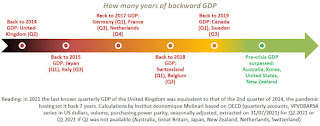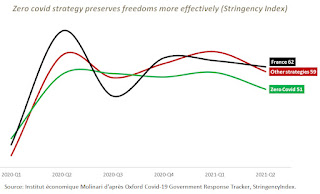THE ZERO COVID STRATEGY PRESERVES FREEDOMS MORE EFFECTIVELYYebeer Ban-Yam is a physicist who studies pandemics Here's the research - but some people prefer short term freedom which only makes thing worse in the long run. 44 times more deaths, 2021 second-quarter GDP set back several years, weakly defended freedoms, reduced mobility: the G10 anti-Covid strategy is on the losing end in every respectInstitut économique Molinari has issued a new study on the lasting value of Zero Covid strategyThe study compares the G10 countries that have opted for a mitigation strategy with three OECD countries that have applied the Zero Covid strategy (Australia and New Zealand) or a similar strategy (South Korea).The elimination strategy continues to produce the best results, challenging the widespread
Topics:
Mike Norman considers the following as important:
This could be interesting, too:
Robert Vienneau writes Austrian Capital Theory And Triple-Switching In The Corn-Tractor Model
Mike Norman writes The Accursed Tariffs — NeilW
Mike Norman writes IRS has agreed to share migrants’ tax information with ICE
Mike Norman writes Trump’s “Liberation Day”: Another PR Gag, or Global Reorientation Turning Point? — Simplicius
THE ZERO COVID STRATEGY PRESERVES FREEDOMS MORE EFFECTIVELY
Yebeer Ban-Yam is a physicist who studies pandemics
Here's the research - but some people prefer short term freedom which only makes thing worse in the long run.
44 times more deaths, 2021 second-quarter GDP set back several years, weakly defended freedoms, reduced mobility: the G10 anti-Covid strategy is on the losing end in every respect
Institut économique Molinari has issued a new study on the lasting value of Zero Covid strategy
The study compares the G10 countries that have opted for a mitigation strategy with three OECD countries that have applied the Zero Covid strategy (Australia and New Zealand) or a similar strategy (South Korea).
The elimination strategy continues to produce the best results, challenging the widespread notion that it was necessary to choose between preserving public health, the economy or freedoms. Far from being in contradiction, these goals are complementary and aligned.
The G10 countries have been hit much harder by the pandemic than the countries that have chosen Zero Covid or similar strategies and that form a representative benchmark (82 million people in economically advanced democracies).
In 2020, countries applying the Zero Covid strategy had almost returned to normal economic activity. Their GDP was down only slightly (-1.6%) compared to 2019. Meanwhile, the decline in GDP was greater (-5%) in G10 countries that had not eradicated the virus.
Zero Covid is a cost-effective economic investment with lasting positive effects. In the first quarter of 2021, the GDP of the Zero Covid countries grew compared to the fourth quarter of 2019 (+1.4%).
In the countries that did not eradicate the virus, GDP decline remained significant compared to the fourth quarter of 2019 (-3.3%).
By 2021, none of the G10 countries had recovered their pre-crisis quarterly GDP levels,
with the exception of the United States, while Australia, New Zealand and South Korea had done so.
THE ZERO COVID STRATEGY PRESERVES FREEDOMS MORE EFFECTIVELY
The Zero Covid strategy costs less in terms of civil liberties.
An analysis of the data that make up the Stringency Index indicates a clear advantage for the Zero Covid countries over the other G10 countries in terms of freedom
The OECD countries applying Zero Covid or similar strategies – Australia, South Korea and New Zealand – have had a restriction level four points lower than the G10 countries over the last year-and-a-half (52 versus 56 in the Stringency Index).
Conversely, the stop-and-go alternance in G10 countries, a consequence of the virus mitigation strategy, leads to a periodic retrenchment of freedoms, reflecting measures to contain the pandemic. As long as the virus continues to spread, freedoms are going to be restricted.
https://twitter.com/yaneerbaryam/status/1430214242913898496?s=19


